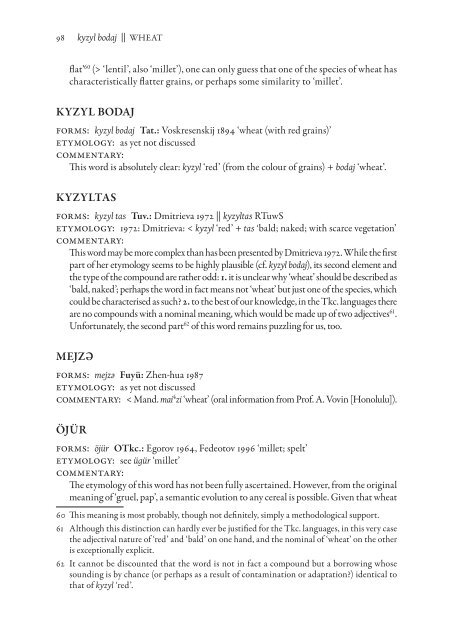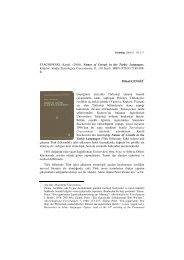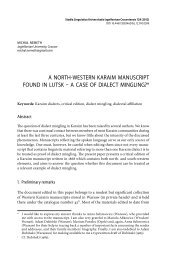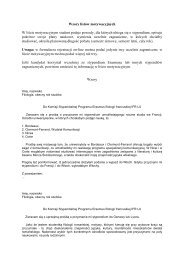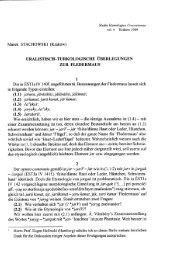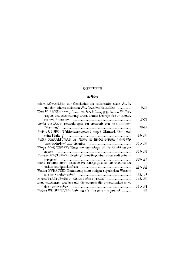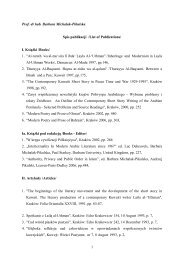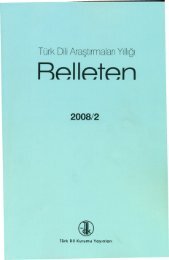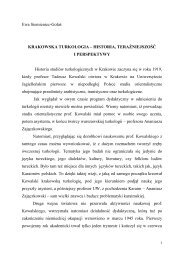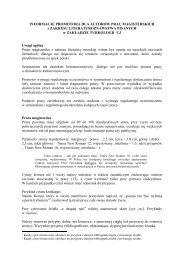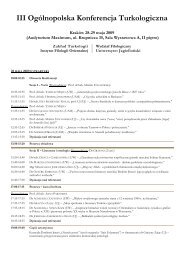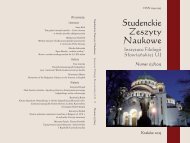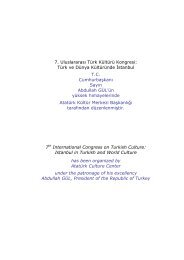Names of Cereals in the Turkic Languages - Wydział Filologiczny UJ
Names of Cereals in the Turkic Languages - Wydział Filologiczny UJ
Names of Cereals in the Turkic Languages - Wydział Filologiczny UJ
- No tags were found...
Create successful ePaper yourself
Turn your PDF publications into a flip-book with our unique Google optimized e-Paper software.
98 kyzyl bodaj || Wheatflat’ 60 (> ‘lentil’, also ‘millet’), one can only guess that one <strong>of</strong> <strong>the</strong> species <strong>of</strong> wheat hascharacteristically flatter gra<strong>in</strong>s, or perhaps some similarity to ‘millet’.kyzyl bodajforms: kyzyl bodaj Tat.: Voskresenskij 1894 ‘wheat (with red gra<strong>in</strong>s)’etymology: as yet not discussedcommentary:This word is absolutely clear: kyzyl ‘red’ (from <strong>the</strong> colour <strong>of</strong> gra<strong>in</strong>s) + bodaj ‘wheat’.kyzyltasforms: kyzyl tas Tuv.: Dmitrieva 1972 || kyzyltas RTuwSetymology: 1972: Dmitrieva: < kyzyl ‘red’ + tas ‘bald; naked; with scarce vegetation’commentary:This word may be more complex than has been presented by Dmitrieva 1972. While <strong>the</strong> firstpart <strong>of</strong> her etymology seems to be highly plausible (cf. kyzyl bodaj), its second element and<strong>the</strong> type <strong>of</strong> <strong>the</strong> compound are ra<strong>the</strong>r odd: 1. it is unclear why ‘wheat’ should be described as‘bald, naked’; perhaps <strong>the</strong> word <strong>in</strong> fact means not ‘wheat’ but just one <strong>of</strong> <strong>the</strong> species, whichcould be characterised as such? 2. to <strong>the</strong> best <strong>of</strong> our knowledge, <strong>in</strong> <strong>the</strong> Tkc. languages <strong>the</strong>reare no compounds with a nom<strong>in</strong>al mean<strong>in</strong>g, which would be made up <strong>of</strong> two adjectives 61 .Unfortunately, <strong>the</strong> second part 62 <strong>of</strong> this word rema<strong>in</strong>s puzzl<strong>in</strong>g for us, too.mejzəforms: mejzə Fuyü: Zhen-hua 1987etymology: as yet not discussedcommentary: < Mand. mai 4 zi ‘wheat’ (oral <strong>in</strong>formation from Pr<strong>of</strong>. A. Vov<strong>in</strong> [Honolulu]).öjürforms: öjür OTkc.: Egorov 1964, Fedeotov 1996 ‘millet; spelt’etymology: see ügür ‘millet’commentary:The etymology <strong>of</strong> this word has not been fully ascerta<strong>in</strong>ed. However, from <strong>the</strong> orig<strong>in</strong>almean<strong>in</strong>g <strong>of</strong> ‘gruel, pap’, a semantic evolution to any cereal is possible. Given that wheat60 This mean<strong>in</strong>g is most probably, though not def<strong>in</strong>itely, simply a methodological support.61 Although this dist<strong>in</strong>ction can hardly ever be justified for <strong>the</strong> Tkc. languages, <strong>in</strong> this very case<strong>the</strong> adjectival nature <strong>of</strong> ‘red’ and ‘bald’ on one hand, and <strong>the</strong> nom<strong>in</strong>al <strong>of</strong> ‘wheat’ on <strong>the</strong> o<strong>the</strong>ris exceptionally explicit.62 It cannot be discounted that <strong>the</strong> word is not <strong>in</strong> fact a compound but a borrow<strong>in</strong>g whosesound<strong>in</strong>g is by chance (or perhaps as a result <strong>of</strong> contam<strong>in</strong>ation or adaptation?) identical tothat <strong>of</strong> kyzyl ‘red’.


